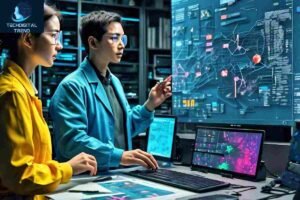Table of Contents
ToggleMachine Learning is Changing the Face of AI
Artificial intelligence (AI) has come a long way since its inception, and machine learning is at the forefront of this revolution. Machine learning, a subset of AI, has enabled machines to learn from data, improve their performance, and make decisions without human intervention. In this blog post, we’ll explore how machine learning is changing the face of AI and transforming various industries.
From Rule-Based Systems to Learning Machines
Rule-based systems, in which computers were programmed to obey a predetermined set of rules, were the foundation of traditional AI systems. But thanks to machine learning, devices can now learn from data and gradually get better at what they do. AI systems are now able to be more precise, effective, and flexible because to this changing.
Applications of Machine Learning in AI
Machine learning has numerous applications in AI, including:
- Natural Language Processing (NLP): Machine learning has enabled AI systems to understand and generate human language, revolutionizing chatbots, virtual assistants, and language translation.
-
Computer Vision: Machine learning has enabled AI systems to recognize objects, people, and patterns, transforming industries like healthcare, security, and retail, Changing the Face of AI.
- Predictive Maintenance: Machine learning has enabled AI systems to predict equipment failures, reducing downtime and increasing efficiency in industries like manufacturing and logistics.
- Fraud Detection: Machine learning has enabled AI systems to detect fraudulent transactions, reducing financial losses and enhancing security in the finance industry.
Industry Transformations
Machine learning is transforming various industries, including:
-
Healthcare: Machine learning is enabling AI systems to diagnose diseases more accurately, develop personalized treatment plans, and streamline clinical workflows, Changing the Face of AI.
- Finance: Machine learning is enabling AI systems to detect fraud, analyze financial data, and make investment decisions.
- Retail: Machine learning is enabling AI systems to personalize customer experiences, optimize inventory management, and improve supply chain efficiency.
- Manufacturing: Machine learning is enabling AI systems to predict equipment failures, optimize production processes, and improve product quality.
Challenges and Opportunities
While machine learning is revolutionizing AI, it also raises challenges and opportunities, including:
- Data Quality: Machine learning relies on high-quality data, which can be a challenge in industries with limited data availability.
- Explainability: Machine learning models can be difficult to interpret, making it challenging to understand their decisions.
- Ethics: Machine learning raises ethical concerns, such as bias, privacy, and job displacement.
- Talent: Machine learning requires specialized talent, which can be a challenge in industries with limited expertise.
Real-World Applications
Machine learning has numerous real-world applications, including:
- Virtual Assistants: Machine learning has enabled virtual assistants like Siri, Alexa, and Google Assistant to understand and respond to voice commands.
- Fraud Detection: Machine learning has enabled fraud detection systems to identify and prevent fraudulent transactions.
- Image Recognition: Machine learning has enabled image recognition systems to identify objects, people, and patterns.
- Natural Language Processing: Machine learning has enabled NLP systems to understand and generate human language.
Conclusion
Machine learning is Changing the Face of AI, enabling machines to learn from data, improve their performance, and make decisions without human intervention. While there are challenges and opportunities, the potential benefits of machine learning in AI are vast, transforming industries and revolutionizing the way we live and work. As machine learning continues to evolve, we can expect even more exciting innovations and applications in the future, Changing the Face of AI.
Machine learning offers a wide range of uses that are changing businesses and enhancing people’s lives, from computer vision to natural language processing. But technology also poses significant moral and cultural issues with regard to discrimination, privacy, and job loss.
In order to guarantee that the advantages of machine learning are distributed fairly and that its obstacles are met in advance, companies, governments, and individuals must collaborate as this technology develops. By doing this, we can fully utilize machine learning to make everyone’s future better.
FAQs
What is machine learning?
A branch of AI called machine learning gives computers the ability to learn from data and gradually get better at what they do.
How does machine learning differ from traditional AI?
Machine learning differs from traditional AI because it enables machines to learn from data, whereas traditional AI relies on rule-based approaches.
What are some applications of machine learning in AI?
Machine learning has numerous applications in AI, including NLP, computer vision, predictive maintenance, and fraud detection.
How is machine learning transforming industries?
Machine learning transforms industries like healthcare, finance, retail, and manufacturing, enabling AI systems to make decisions, improve efficiency, and reduce costs.
Open this link: Tap to here















